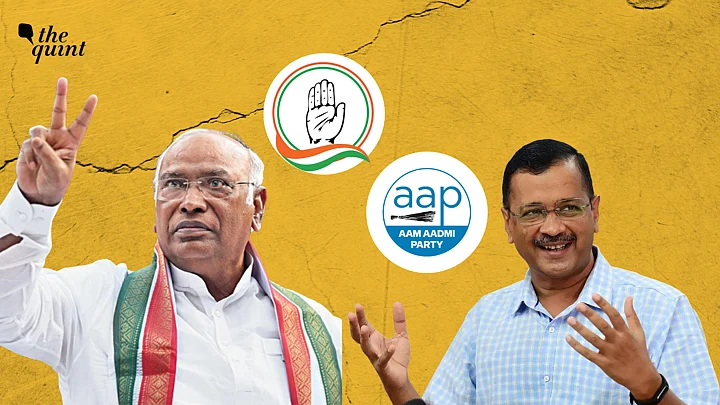The Congress party, on Sunday, 16 July, announced its unequivocal opposition to Narendra Modi government's ordinance giving the Centre control of services in Delhi.
This has now paved way for the Aam Aadmi Party to attend the Opposition meeting in Bengaluru that begins on 17 July. AAP had made this a pre-condition for its involvement in any efforts towards Opposition unity.
The announcement was made by Congress General Secretary (Organisation) KC Venugopal, who said,
"Our stand is clear. We will oppose every attempt by the Centre to undermine federalism."
In response to this, AAP's Rajya Sabha MP Raghav Chadha tweeted, "Congress announces its unequivocal opposition to the Delhi Ordinance. This is a positive development."
Sources in the Congress say that the final decision to oppose the ordinance was taken by party president Mallikarjun Kharge. There are four aspects to this.
1. Principle Over Partisan Interests
"The Congress president has chosen principle over politics," said a source close to Kharge.
The Delhi and Punjab units of the Congress were not in favour of co-operating with AAP on the ordinance.
But Kharge sees federalism as a key theme in the Congress' national campaign and, therefore, chose to prioritise that.
This is consistent with Kharge's decision making in general. Even while selecting Siddaramaiah as the Karnataka CM, Kharge set aside his own uneven history with the leader as he was both the most popular choice and important from the point of view of social coalition.
2. The Timing is Important
In the Opposition meeting that took place in Patna, AAP had insisted that the Congress make its stand on the ordinance clear. The Congress had refused to concede the demand at that moment and said that this wasn't part of the meeting's agenda.
The Congress took its time in announcing this decision, though sources say Kharge had made up his mind much earlier.
The delay is said to have been mainly because the Congress wanted to send the message that it cannot be blackmailed.
Again, this is consistent with Kharge's approach to not get rushed into decisions. For instance regarding the party's Rajasthan crisis, Kharge didn't reach out to Sachin Pilot for several weeks despite the latter's statements. He took his own time to address it.
3. Anti-Ordinance But Not Pro-AAP
Though Congress has decided to oppose the ordinance, it doesn't mean that this is an endorsement of AAP.
AAP Convenor and Delhi Chief Minister Arvind Kejriwal had tweeted that he had sought time with Congress President Mallikarjun Kharge and former chief Rahul Gandhi to discuss the ordinance. However, the party didn't give time to Kejriwal.
Apparently, that was out of respect for the concerns of the party's Punjab and Delhi units.
4. Balance Within the Opposition 'Coalition'
Congress sources say that supporting the ordinance was never even on the cards. The choice was mainly between opposing it and abstaining.
If the Congress had abstained, it would have made the passage of the Bill in the Rajya Sabha a foregone conclusion.
This in turn could have led to distrust within the Opposition, as all the other parties that attended the Patna meeting had agreed to oppose the ordinance.
By now coming out openly against it, the Congress has prevented that from happening. But taking its time was also the party's way of showing that it cannot be pushed around within the Opposition space.
